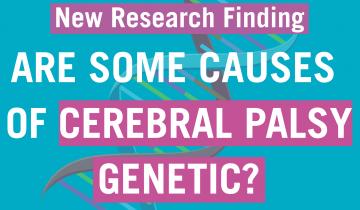In 10% to 15% of cases, there is no clear cause of CP. There is increasing recognition that genetics plays a part, but no standardized approach to genetic testing in patients with CP exists. In this study we asked the question whether both people with and without known risk factors for CP should have genetic testing.
The GMFCS can be a helpful tool in clinical and research use and has been shown to be stable and accurate over time. It can also help individuals and families better understand cerebral palsy.
We got the diagnosis of Cerebral Palsy when Lelia was 18 months. I was really happy, as we didn’t know what was wrong with her before then. She had low tone. She couldn’t roll over. She couldn’t sit up. Of course she didn’t walk. The diagnosis gave it a name, something I could work with, and I became a kind of vigilante mother, determined to get the best care for my daughter.

An international study recently published in the journal Nature Genetics has provided the first firm evidence that for a substantial number of people, their cerebral palsy (CP) may be caused by a genetic mutation, or mis-spelling in the body’s DNA blueprint.

"In addition to commonly associated environmental factors, genomic factors may cause cerebral palsy. We performed whole-exome sequencing of 250 parent–offspring trios, and observed enrichment of damaging de novo mutations in cerebral palsy cases."
Oropharyngeal dysphagia, or OPD, is an impairment of the oral or pharyngeal phases of the swallow. This can impair muscle movements and coordination of the mouth, such as the lips, tongue, jaw, cheeks, palate, and also muscles of the pharynx and the entry to the airway.

